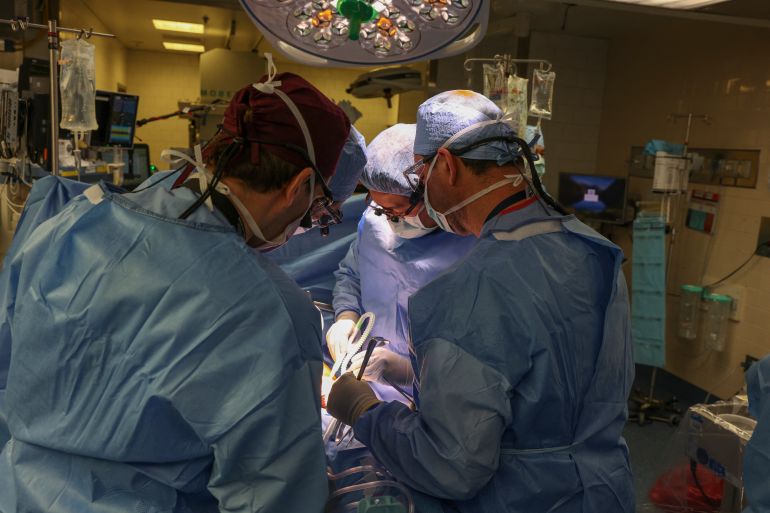Posted by
–
5월 9, 2024
인간 최초의 돼지 신장: 이것이 이식의 미래인가?
유전자 편집 돼지 신장을 인간에게 성공적으로 이식하면 장기 부족 위기가 종식될 수 있을까요?
외과의사 팀이 처음으로 돼지 신장을 살아있는 환자에게 성공적으로 이식했습니다. [Michelle Rose/Massachusetts General Hospital/AFP]
작성자: 사라 샤밈
게시일: 2024년 4월 12일12 2024년 4월
돼지로부터 유전자 변형 신장 이식을 받은 최초의 남성이 지난주 수요일 병원에서 퇴원했습니다.
말기 신장병을 앓고 있던 리처드 ‘릭’ 슬레이먼(62세)이 매사추세츠주 보스턴에 있는 하버드 의과대학 최대 교육병원인 매사추세츠 종합병원(MGH)에서 획기적인 시술을 받은 후 더 이상 투석이 필요하지 않게 됐다.
계속 읽으세요
첫 번째 돼지 신장 이식은 어떻게 진행됐나?
Slayman은 말기 신장 질환 진단을 받았습니다. 이는 그의 신장이 스스로 기능할 수 없음을 의미합니다. 그는 MGH에서 인간 기증자로부터 첫 신장 이식을 받은 2011년부터 2018년까지 투석을 받았습니다.
약 5년 후, 이식된 신장이 실패의 조짐을 보이기 시작했고, 2023년 5월 Slayman은 투석을 다시 시작했습니다. 그 후 그는 투석 환자들에게 흔히 나타나는 투석 관련 합병증을 경험하기 시작했습니다. 따라서 그는 혈전 제거 및 수술 교정을 위해 정기적인 병원 방문이 필요했고, 이는 그의 삶의 질에 영향을 미쳤습니다.
“유전자 편집” 돼지 신장은 인간과 호환되는 공학적 장기를 개발하는 매사추세츠 주 케임브리지의 생명공학 회사인 eGenesis가 제공했습니다. 회사는 유전자 편집을 이용해 돼지 기증자로부터 유해한 돼지 DNA를 제거하고, 인간 DNA를 첨가해 신장이 인체와 더 잘 호환되도록 만들었다.
Slayman은 3월 16일에 진행된 4시간의 시술 후 2주 만에 집으로 돌아올 수 있을 만큼 회복되었습니다.
Slayman은 4월 3일 MGH가 발표한 성명에서 “오랜만에 받은 가장 깨끗한 건강 진단서 중 하나로 오늘 퇴원하는 것”을 인생에서 가장 행복한 순간 중 하나로 꼽았습니다.
이 절차는 “이종 이식”의 한 예입니다. 한 종에서 다른 종으로 장기를 이식하는 것입니다.
이 이식은 생명을 위협하는 질병을 앓고 있는 환자에게 실험적 치료 접근을 허용하는 단일 확장 접근 프로토콜, 즉 “자비로운 사용”을 통해 식품의약국(FDA)의 승인을 받았습니다.
“제 이야기를 보시고 행운을 빌어주신 모든 분들, 특히 신장 이식을 기다리는 환자분들께 감사하다는 말씀을 전하고 싶습니다. 오늘은 저뿐만 아니라 그들에게도 새로운 시작이 되는 날입니다.”라고 Slayman은 말했습니다.
알자지라에 가입하세요
이것이 왜 중요합니까?
MGH는 보도자료에서 “이 절차는 환자에게 보다 쉽게 이용할 수 있는 장기를 제공하려는 탐구에 있어서 중요한 이정표”라고 밝혔습니다.
이 절차의 성공은 미국과 그 외 지역의 장기 부족 위기 속에서 한 줄기 희망을 제공했습니다.
장기 조달 및 이식 네트워크(Organ Procurement and Transplantation Network)에 따르면 현재 미국 내 103,000명 이상의 사람들이 여전히 장기 이식을 기다리고 있습니다. 네트워크 데이터에 따르면 미국에서는 매일 17명이 장기 이식을 기다리다가 사망하는 것으로 나타났습니다.
Slayman의 시술을 감독한 MGH의 신장 이식 의료 책임자인 Leonardo V Riella는 “이종 이식이 장기 부족 위기에 대한 유망한 해결책이 될 것이라고 굳게 확신합니다.”라고 말했습니다.
United Network의 최고 의료 책임자인 David Klassen은 “아직 해야 할 일이 많이 남아 있지만 이는 이종 이식의 실제 가능성을 나타내는 전체 이식 커뮤니티를 위한 주요 상징적 행사이며 언젠가는 많은 환자에게 혜택을 줄 것입니다.”라고 말했습니다. 미국 연방 정부와 함께 국가 이식 시스템을 운영하는 비영리 단체인 장기 공유(UNOS)는 알 자지라에 말했습니다.
그는 이것이 “장기 이식의 필요성과 이식 가능한 장기 수 사이의 격차”를 해소하기 시작할 수 있다고 덧붙였습니다.
종간 기관이 표준이 될 수 있을까?
돼지나 다른 동물의 장기 이식이 널리 보급되기 전에 더 많은 연구가 이루어져야 합니다.
2022년 1월, 데이비드 베넷이라는 미국인 남성이 유전자 편집 돼지 심장을 받았는데, 이 심장은 그의 몸에서 기능하는 것으로 보였습니다. 하지만 2022년 3월 베넷이 세상을 떠났습니다. 정확한 사망 원인은 공개되지 않았습니다.
2023년 9월, 로렌스 포세트(Lawrence Faucette)는 미국에서 유전자 변형 돼지 심장을 받은 두 번째 사람이 되었습니다. 그러나 6주 후에 그도 사망했습니다. 이식이 실시된 메릴랜드 대학 메디컬 센터는 심장이 거부 반응을 보이기 시작했다고 말했습니다.
그러나 같은 달 뉴욕 대학교 Langone Health의 외과 의사들은 유전자 편집 돼지 신장 이식이 인간의 뇌사체 내부에서 정상적으로 작동했다고 결론지었습니다.
UNOS의 최고 의료 책임자인 Klassen은 “모든 장기 이식에는 거부의 위험이 있습니다.”라고 말했습니다.
Klassen은 거부가 흔하며 신체가 트라를 거부하고 있다는 신호라고 설명했습니다.
이식된 장기는 이식 약물을 조정하여 치료합니다.
Klassen 박사는 “최근 이종 이식은 과학자와 연구자들이 유전자 변형 돼지 장기를 사용하여 즉각적인 거부 위험을 극복할 수 있다는 것을 보여주었습니다.”라고 말했습니다.
UNOS의 최고 의료 책임자는 이 절차가 의료 전문가들의 수십 년 간의 연구를 기반으로 한다고 덧붙였습니다.
“그러나 이것이 널리 보급되기까지는 아직 해야 할 일이 많이 남아 있습니다. 예를 들어 다수의 환자를 대상으로 이를 재현한 임상 시험과 장기적인 결과에 대한 연구입니다.”
출처: 알자지라
First pig kidney in a human: Is this the future of transplants?
Could the successful transplant of a gene-edited pig kidney to a human spell the end of the organ shortage crisis?

By Sarah Shamim
Published On 12 Apr 202412 Apr 2024
The first man to receive a genetically modified kidney transplant from a pig was discharged from hospital on Wednesday last week.
Richard “Rick” Slayman, 62, who had been suffering from end-stage kidney disease, no longer needs dialysis after the groundbreaking procedure at Massachusetts General Hospital (MGH), Harvard Medical School’s biggest teaching hospital in Boston, Massachusetts.
KEEP READING
How did the first pig kidney transplant go?
Slayman had been diagnosed with end-stage renal disease, which means his kidneys could not function on their own. He was placed on dialysis from 2011 until 2018 when he received his first kidney transplant from a human donor at MGH.
About five years later, the transplanted kidney started showing signs of failure and, in May 2023, Slayman restarted dialysis. After this, he started experiencing complications associated with dialysis which are common among dialysis patients. Hence, he required regular hospital visits for de-clotting and surgical revisions, which affected his quality of life.
The “gene-edited” pig kidney was provided by eGenesis, a biotechnology company in Cambridge, Massachusetts which develops human-compatible engineered organs. The company removed harmful pig DNA from the pig donor using genetic editing, and added human DNA to make the kidney more compatible with the human body.
Slayman was well enough to return home just two weeks after the four-hour procedure, which took place on March 16.
Slayman called “leaving the hospital today with one of the cleanest bills of health I’ve had in a long time” one of the happiest moments of his life, in a statement released by MGH on April 3.
The procedure is an example of “xenotransplantation”: the transplantation of organs from one species to another.
The transplant was approved by the Food and Drug Administration (FDA), through a single Expanded Access Protocol, or “compassionate use”, which grants experimental treatment access to patients with life-threatening diseases.
“I want to thank anyone who has seen my story and sent well wishes, especially patients waiting for a kidney transplant. Today marks a new beginning not just for me, but for them, as well,” said Slayman.
Sign up for Al Jazeera
Why does this matter?
“The procedure marks a major milestone in the quest to provide more readily available organs to patients,” MGH stated in a press release.
The success of the procedure has provided a ray of hope amid the organ shortage crisis in the United States and beyond.
At the moment, more than 103,000 people in the US are still waiting for organ transplants, according to the Organ Procurement and Transplantation Network. The network’s data also shows that 17 people in the US die every day waiting for an organ transplant.
“I am firmly convinced that xenotransplantation represents a promising solution to the organ shortage crisis,” said Leonardo V Riella, medical director for kidney transplantation at MGH, who oversaw Slayman’s procedure.
“Although much work remains to be done, this is a major symbolic event for the entire transplant community that represents a real possibility of xenotransplantation, one day benefitting a large number of patients,” David Klassen, the chief medical officer of the United Network for Organ Sharing (UNOS), a non-profit organisation which runs a national transplant system with the US federal government, told Al Jazeera.
He added that this could begin to bridge “the gap between the need for organ transplantation and number of organs available for transplantation”.
Could interspecies organs become the norm?
More research needs to be done before organ transplants from pigs or other animals become widely available.
In January 2022, an American man named David Bennett received a gene-edited pig heart, which seemed to be functioning in his body. In March 2022, however, Bennett passed away. The exact cause of death was not released.
In September 2023, Lawrence Faucette became the second person in the US to receive a genetically modified pig heart. Six weeks later, however, he also died. The University of Maryland Medical Center, where the transplantation was performed, said the heart had begun to show signs of rejection.
The same month, however, surgeons at New York University Langone Health concluded that a gene-edited pig kidney transplant had worked normally inside a brain-dead body of a human.
“There is a risk of rejection for all organ transplants,” Klassen, the UNOS chief medical officer said.
Klassen explained that rejection is common and signs that the body is rejecting a transplanted organ are treated with adjustments to transplant medications.
“The recent xenotransplants have shown that scientists and researchers have been able to overcome the immediate rejection risk with genetically modified porcine organs,” Klassen said.
The chief medical officer of UNOS added that this procedure is based on decades of research by medical specialists.
“But there is still much left to do before it could become widely available, such as clinical trials that replicate this in a large number of patients and the study of long-term outcomes”.
SOURCE: AL JAZEERA










